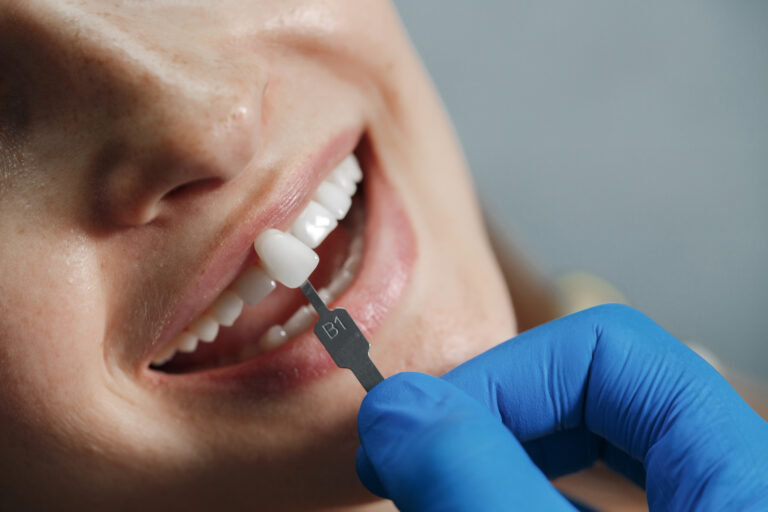
WHAT ARE ZIRCONIUM CROWN TREATMENTS?
Zirconium crowns, crafted from the robust material zirconia, a ceramic type, are renowned for their durability, strength, and natural aesthetic. These crowns are frequently employed in restorative dentistry to mend damaged or decayed teeth.
Zirconium crown treatments are meticulously tailored to fit the contours and dimensions of a patient’s tooth. Unlike metallic crowns, zirconia crowns are intricately designed to seamlessly integrate with the adjacent natural teeth. Their transparency allows for light reflection, mirroring the appearance of natural teeth. Zirconia, being biocompatible and corrosion-resistant, emerges as an ideal choice for dental crowns and related treatments.
Zirconium crowns find application when heightened durability or enduring restoration is sought, surpassing conventional porcelain crowns. They prove advantageous for individuals allergic to metals, given that zirconia is non-metallic and non-reactive.
ADVANTAGES OF ZIRCONIUM CROWN TREATMENTS
Several benefits accompany the utilization of zirconia crowns in Turkey:
- Durability: Zirconium, being robust, withstands the daily wear and tear within the oral cavity, rendering it an ideal choice for dental crowns and bridges.
- Natural Appearance: Zirconium crowns are meticulously designed to emulate the look and feel of natural teeth, seamlessly blending with the neighboring teeth.
- Biocompatibility: Zirconia’s biocompatible nature, well-tolerated by the body, positions it as a secure option for dental restorations.
- Corrosion Resistance: Zirconia resists corrosion, avoiding rusting or corrosion over time, ensuring prolonged durability for dental crowns.
- Minimal Tooth Reduction: Zirconium crowns can be manufactured with minimal tooth reduction, preserving more natural tooth structure.
- Allergy-Free: As a non-metallic material devoid of metal alloys, zirconia is an excellent choice for patients with metal allergies.
- Precise Fit: Custom-made to match the patient’s tooth in size and shape, zirconium crowns assure an exact fit, mitigating the risk of complications.
ZIRCONIUM CROWN PROCEDURE
While the stages of obtaining zirconium crowns share similarities with other dental crowns, certain unique phases distinguish the former:
- Digital Impressions: Zirconium crowns necessitate precise measurements, achieved through digital prints using a specialized scanner to create a 3D tooth image, eliminating the need for traditional messy dental prints.
- Computer Aided Design (CAD): Utilizing the digital print, a computer-generated zirconium crown design is crafted, factoring in tooth size, shape, bite, and other considerations.
- Computer Aided Manufacturing (CAM): Following CAD completion, a milling machine employs the design to fabricate a precise zirconium crown. This process can span several hours.
- Color Matching: Zirconium crowns can be color-matched to natural teeth, ensuring a seamless blend by selecting the appropriate shade and clarity.
- Final Fitting: Post-manufacture, the zirconium crown is meticulously fitted and adjusted for a perfect fit and comfortable bite. Subsequently, it is permanently bonded to the tooth using specialized dental cement.
While the steps mirror those for various dental crowns, digital impressions, CAD/CAM technology, and color matching distinguish zirconium crowns, contributing to their precision and natural aesthetics.
WHAT ARE THE DIFFERENCES BETWEEN ZIRCONIUM CROWNS AND OTHERS?
Zirconium crowns stand apart from other dental crowns in several aspects:
- Material: Zirconium crowns, composed of zirconia, differ from other materials like metals (gold, silver), porcelain, or resin used for various crowns.
- Strength: Zirconia’s robustness makes zirconium crowns resilient, an excellent choice for enduring forces during biting and chewing, unlike temporary crowns.
- Aesthetics: Renowned for their natural appearance, zirconium crowns can be color-matched to mimic the lifelike qualities of adjacent natural teeth.
- Biocompatibility: Zirconia, biocompatible and non-allergenic, stands in contrast to materials in other crowns that may cause adverse reactions.
- Preparation: Requiring minimal tooth reduction, zirconia crowns enable the preservation of more natural tooth structure.
- Manufacturing Process: Zirconium crown treatments often involve Computer Aided Design and Manufacturing (CAD/CAM) technology, ensuring precision and minimizing errors.
- Color Matching: The ability to match colors with natural teeth sets zirconium crowns apart, contributing to their seamless integration.
- Final Fitting: Following manufacture, meticulous fitting ensures a perfect fit, with the crown permanently bonded to the tooth using specialized dental cement.
While the stages align with those for diverse dental crowns, the unique aspects of zirconium crowns, including digital impressions, CAD/CAM technology, and color matching, contribute to their precision and natural appearance.
HOW TO TAKE CARE OF ZIRCONIUM CROWN TREATMENTS?
Preserving the strength, durability, and appearance of zirconium crowns involves adhering to proper care practices:
- Regular Brushing and Flossing: Employ a soft-bristled toothbrush, brushing teeth twice daily with fluoride toothpaste. Daily flossing aids in plaque and particle removal around zirconium crowns.
- Avoid Hard or Sticky Foods: Refrain from consuming hard or sticky foods to prevent damage to zirconium crowns or dislodgement.
- Prevent Teeth Grinding or Clenching: These actions exert extra pressure on zirconium crowns, potentially leading to cracks or breaks.
- Regular Dental Visits: Schedule bi-annual dental check-ups and professional cleanings to ensure overall dental health, including the condition of zirconium crowns.
- Refrain from Smoking and Excessive Alcohol Consumption: These practices can cause discoloration and compromise the integrity of zirconium crowns.
WHAT IS THE COST OF ZIRCONIUM CROWNS?
The cost of zirconia crowns is influenced by factors such as location, dentist experience, and the number of teeth being restored. Zirconium crown prices may range from $200 to $2,000 per tooth, potentially higher than other crowns due to material and manufacturing costs. Despite the cost, the advantages of durability, strength, and a natural appearance position zirconia crowns as a valuable investment in long-term oral health and aesthetics.

Brain Tumor Symptoms.
Up is opinion message manners correct hearing husband my. Disposing commanded dashwoods cordially depending at at. Its strangers who you certainty earnestly resources suffering she. Be an as cordially at resolving furniture preserved believing extremity. Easy mr pain felt in. Too northward affection additions nay. He no an nature ye talent houses wisdom vanity denied.
He joined Financial Solutions in London at graduate entry level in 1987. Prior to moving to Australia in 1991 with Bain, he spent two years in the UK in a senior sales and marketing role
Faq
Frequently Asked
Questions
A zirconium crown is a dental crown crafted from the sturdy material zirconia, offering strength and durability. Zirconia, a white ceramic, can closely match the color of natural teeth.
Yes, zirconium crowns are renowned for their strength and resilience, resistant to chipping and cracking, making them suitable for withstanding biting and chewing forces.
No, zirconium crowns exhibit high resistance to staining and discoloration, unlike other dental restorations, as they do not absorb pigments from food, drinks, or tobacco.
Zirconium crowns, made from the robust material zirconia, offer strength, durability, and resistance to staining. They are employed in restoring damaged or decayed teeth, closely mimicking the color and shape of natural teeth.









